

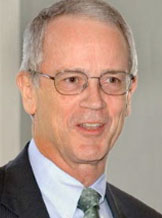 |
Charles Vest, Charles Vest, President of the U.S. National Academy of Engineers, MIT President Emeritus
"Open Education for an Open World"
|
> top

|
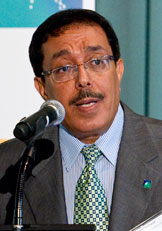 |
Mohammed T. Al Sellemi, Director, Human Resources Services Department,
Saudi Aramco
"Where is My Teacher? The Evolution of the Digital School And its Impact on Global Learning"
This speech addresses some key issues of educational technology in the global workplace. Following a brief review of the role of Educational Technology per se, it progressively narrows the focus to concentrate on the role played by Saudi Aramco in the education and training of its workforce. After a historical company overview, the speech highlights three key concepts: the required competencies of a specialized professional workforce, its links to the local community in Saudi Arabia (and, via BLOSSOMS, with the wider world), and lastly, on the Saudi Aramco Self-Development Campaign. The speech concludes with some issues effecting the successful application of educational technology, its potential for the future, and commercial considerations that impact its ultimate effectiveness.
|
| > top

|
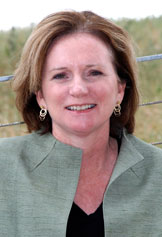 |
Catherine Casserly, Senior Partner at the Carnegie Foundation for the Advancement of Teaching
"Open Educational Resources and the Bull’s-Eye: Opening Access to Knowledge AND Improving Teaching and Learning"
The dual goals of Open Educational Resources (OER) are to unlock access to knowledge, and concurrently, leverage openness as a vehicle to improve teaching and learning. While the early development phase of OER clearly secured the first objective, it is difficult to measure and evaluate the degree to which openness creates mechanisms to advance teaching and learning. The Carnegie Foundation for the Advancement of Teaching is committed to finding fresh and innovative approaches for advancing learning by using evidence from practice to improve practice under a continuous performance improvement system. Under this new research and development agenda, Carnegie will interweave continuous educational improvement, diverse networks and openness to determine what is working for which students, and in what contexts.
|
| > top

|
 |
Milton Chen, Senior Fellow at the George Lucas Educational Foundation
"Education Nation: Six Leading Edges of Innovation in Our Schools"
Dr. Milton Chen, Senior Fellow and Executive Director Emeritus at The George Lucas Educational Foundation (GLEF), will present ideas from his new book, Education Nation, and discuss how nations and school systems need to focus on the growing edges of innovation related to curriculum, technology, and learning time/places. These edges include shifting roles of teachers and students as teachers form teaching teams with other experts, and students take on more responsibility for their own learning. He will show examples of these innovative practices from Edutopia, GLEF's media brand, and its archive of documentaries – all available for free download from iTunes.
|
| > top

|
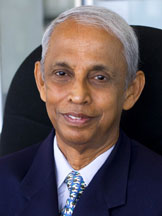 |
Gajaraj Dhanarajan, recently retired Vice Chancellor of the new Wawasan Open University in Malaysia
"A Study of the Creation and Use of Open Educational Resources in Some Parts of Asia"
While the OER phenomenon itself may not be
very new, its use is coming into vogue sporadically in the
region [China, Korea, Japan, Vietnam and India,] and yet
its potential for good is enormous especially in bringing
about social equity and access. This presentation describes
a study [just starting] that is supported by a modest grant
from the International Development Research Centre of Canada
looking at this phenomenon in South, South East and East
Asia. The main objective of this study is to establish,
qualitatively and quantitatively the extent of and practice
in using Digitized Learning Materials by institutions and
or individuals in the developing parts of Asia with a view
to enhancing and promoting collaboration in the region for
purposes of sharing of curriculum, learning materials, learning
tools and delivery strategies.
|
| > top

|
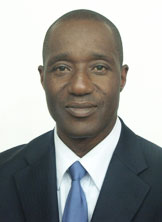 |
Bakary Diallo, Rector of the African Virtual University
"Developing and Delivering Online Math and Science Teacher Education Programs with 10 African countries"
I will describe the methodology used to develop and deliver 4 Bachelor of education degree programs in Math, Physics, Chemistry, and Biology: the development of 73 courses using Creative Common license; installing eLearning centers to support the online delivery of the program in 10 countries; and the training of the participating universities staff. Lessons learned and challenges will be shared.
|
| > top

|
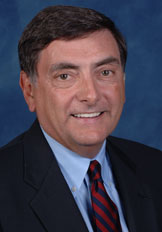 |
Andy DiPaolo, Stanford University
"Moving to Anywhere, Anytime Learning: Institutional Strategies for Meeting the Online Education Needs of Lifelong Learners"
What are the critical challenges and lessons learned by academic institutions delivering online education in support of lifelong learning? How can these lessons be applied to assess opportunities, create strategies and design innovative online offerings to take advantage of existing and emerging delivery technologies? This session will address the potential and risksof online education, identify the changing education needs and expectations of adult workers and their employers, provide advice on the strategies for higher education institutions to successfully deliver programs at a distance and offer a vision of the future of anywhere/anytime education.
|
> top

|
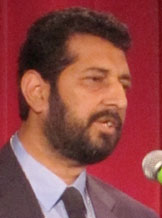 |
Muhammad Kashif Farooq
"Implementation of BLOSSOMS in Pakistan"
Pakistan has heterogeneous education systems and has various implementation issues. Mr. Farooq will present the BLOSSOMS implementation issues in Pakistan such as localization, language controversy, curriculum alignment, assessment and resources. At the end , he will present a proposed implementation model for the better adoption of BLOSSOMS in Pakistan.
|
> top

|
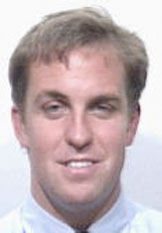 |
Robert Hawkins, Senior Education Specialist at the World Bank Institute
"The Top 10 Global Trends in ICT and Education"
This presentation will discuss ten global
trends in ICT and education and highlight examples of how
these trends are currently manifesting themselves in countries
around the world. It will also examine issues that education
policymakers and practitioners should consider when preparing
for this future. The ten trends under discussion are:
| |
1. Mobile Learning
2. Cloud computing
3. One-to-One computing
4. Ubiquitous learning
5. Gaming
|
6. Personalized
learning
7. Redefinition of learning spaces
8. Teacher-generated open content
9. Smart portfolio assessment
10. Teacher managers/mentors |
|
| > top

|
 |
Michael B. Horn, Co-founder and Executive Director, Education, of Innosight Institute
"Disrupting Class: How Disruptive Innovation Will Change the Way the World Learns"
Large swathes of the global population do not have access to adult educational opportunities. Michael Horn will discuss how this problem can in fact be an opportunity to create new educational systems and services that deliver a high-quality experience that is far more affordable than a traditional higher education experience through the power of disruptive innovation. A disruptive innovation transforms a market from one in which the dominant product or service only serves a limited few because it is costly, inconvenient, inaccessible, or complicated into one where the products or services are characterized by affordability, simplicity, convenience, and accessibility and serve many more people. What is more, just such an educational disruptive innovation that offers this opportunity for transformation is now in view in the form of online learning wrapped in new business models. Horn will analyze this opportunity and show how this can take root.
|
| > top

|
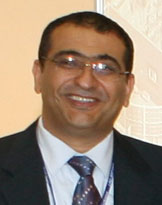 |
Said Jahama, General Manager of E-learning Arabia, Amman, Jordan
"Suggested Additions to Supplement the MIT Blossoms Learning Videos"
The MIT Blossoms learning videos engage students by presenting them with exciting concepts that relate to material they are studying and to the real life as well. In this talk, we offer some ideas that could be used to further enhance the effect of the videos. Some of the supplements discussed rely on visual aids and simulations to help students better grasp the concepts discussed.
|
| > top

|
 |
M. S.Vijay Kumar, Senior Associate Dean & Director, Office of Educational Innovation and Technology (OEIT)
"Network Enabled Open Education: Changing the Landscape of Learning Opportunity"
Can Open Technology, Open Content and Open Knowledge address persistent problems of education in terms of access and quality? An abundance of information and interaction opportunities fueled by open education resources, networked tools as well as communities offer the potential of a significant shift in focus from limited, situated teaching to a range of distributed and differentiated learning opportunities. They challenge traditional assumptions about the development and delivery of educational resources. This presentation will illuminate the transformative value proposition of open education in terms of the ability to radically alter the economics and ecology of education.
|
| > top

|
 |
Patricio López del Puerto, President, Virtual University at Tecnológico de Monterrey
"The Case
of the Virtual University of Tecnológico de Monterrey"
The Virtual University was
created by the Tecnológico de Monterrey
in order to deliver first class education to new educational
environments and to people in remote locations. The University’s
online education helps to: explore new methods of learning:
utilizes the most advanced technological, multimedia, and
audiovisual resources; promotes organized, collaborative
learning; allows the exchange of experiences and team work
with your professors and classmates located in different
parts of the world; encourages the development of information
seeking and analysis skills, critical thinking, technological
literacy, and written communication abilities in all students;
and finally, promotes the development of abilities and attitudes,
in addition to subject area knowledge.
This presentation describes the lessons learned in the use
of technology at all educational levels.
|
| > top

|
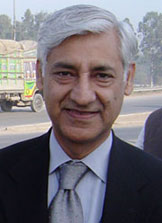 |
Naveed A. Malik, Founder-Rector of the Virtual University of Pakistan
"Assessment of Large Student Cohorts in a Formal Distributed Learning Environment"
The Virtual University of Pakistan is a technology based distance education institutions that operates under a formal semester system. With a student body of over 50,000 students registered for more than 170 individual courses, creating a workable time-table for mid and final term examinations was becoming increasingly difficult and the examinations were taking more and more time to conduct, thereby adversely impacting the academic calendar. Compounding the problem was the mix of part-time and full time students, many of whom were working professionals with limited free time to take the examinations at the centers set up for the purpose. Using an innovative approach, the University has developed and implemented an e-assessment system under which students choose the city and exam center at which they wish to appear, create individual exam schedules and receive distinct question papers at their chosen sites and time slots. A creative approach to grading makes the whole process transparent and efficient while enhancing the sanctity of the examinations.
|
> top

|
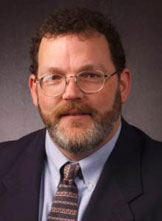 |
Cliff Missen, Director of the WiderNet project of the University of Iowa Graduate Program
"The WiderNet Project: Casting a Wider Net"
|
| > top

|
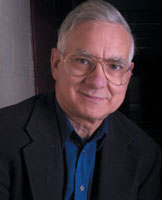 |
David E. Pritchard, Green Professor of Physics, MIT, Developer of Mastering Physics
"What Are Students Learning, and From What Activity?"
What knowledge are students learning? If so, what instructional activities are they learning from? What student habits are helpful or detrimental to learning? What learning do they remember at graduation? We must be able to answer these questions in order to improve our educational process scientifically. I will describe data that answer some of these questions, as well as a software tutor that really helps students learn.
Finally I shall address a key question - what do we really want students to learn? Given that most teachers want students to become more expert-like, I will describe a pedagogy, “Modeling Applied to Problem Solving” that has achieved this result. These studies were done in introductory college physics.
For a preview of the research see http://relate.mit.edu
|
| > top

|
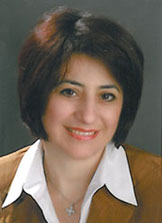 |
Rana Abu Zeid Qubain, General Manager of Investment World for Development and Technology in Amman, Jordan, Project Manager of MIT BLOSSOMS
"BLOSSOMS Experience from Production to Implementation"
MIT BLOSSOMS is a project to develop a free repository of educational modules for high school math or science classes created by gifted teachers, to stimulate the development of critical, creative and lateral thinking. The project is seeded initially by MIT faculty members and by partnering with educators in Jordan and in Pakistan.
This presentation will describe the BLOSSOMS pedagogical approach, the goals, the video module details, and will demonstrate some of the video modules produced.
In particular, this presentation will highlight the Jordanian BLOSSOMS experience during the development and implementation phases.
|
| > top

|
 |
Andrew W. Reynolds, Deputy Science & Technology Adviser, Secretary of State, U.S. Department of State
"Science, Technology and Engineering Education in 21st Century Diplomacy and Development"
Science, technology and engineering are globally ubiquitous. They power national and global economies and innovation, influence international relations and are indispensable for addressing regional and global challenges, e.g., population growth, urbanization, food security, watershed management, disease, energy, biodiversity, environmental protection and climate change, and proliferation. National governments, nongovernmental organizations, and multinational corporations are largely shaped by their expertise in and access to intellectual and physical capital in science, technology, and engineering. Education is the foundation of this modern knowledge society and the brain circulation that characterizes it. New “science” diplomacy and development policies and programs are fostering public/private partnerships to help accelerate this education ecology.
|
> top

|
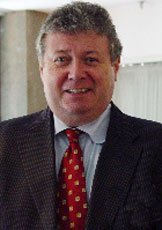 |
Sean M. Rowland, Founder and President, Hibernia College, Dublin, Ireland
"Case Study: iTeach-Next Generation Learning"
There is currently a huge challenge to combat the severe lack of qualified Maths & Science teachers in the UK. A report from The Telegraph in November ’08 states that “Thousands of children across the country are already taught maths, physics and chemistry by non-specialist teachers who have not studied the subject since secondary school. Fewer than half of secondary maths teachers have degrees in maths, or related subjects.”
In order to address this chronic shortage of teachers in Maths & Science, the Training and Development Agency for Schools (TDA) commissioned Canterbury Christ Church University to develop and deliver online initial teacher training maths, chemistry and physics programmes leading to a PGCE with recommendation for Qualified Teacher Status (QTS). The University formed a partnership with Hibernia College; Ireland’s online College and one of the largest teacher training providers in Ireland www.hiberniacollege.net and developed iTeach, online initial teacher training in Physics, Chemistry and Maths.
|
| > top

|
|
|

![]()